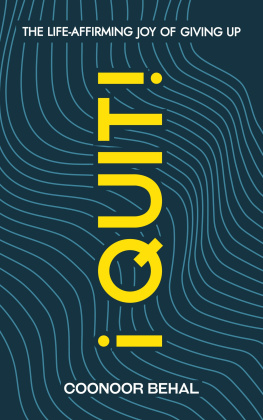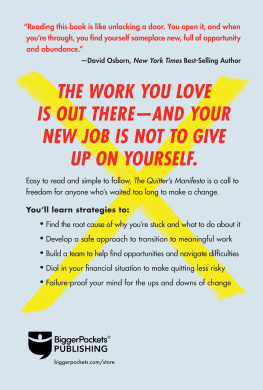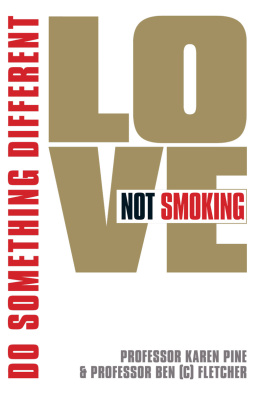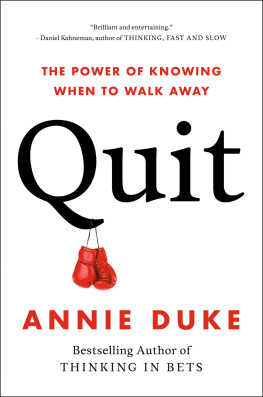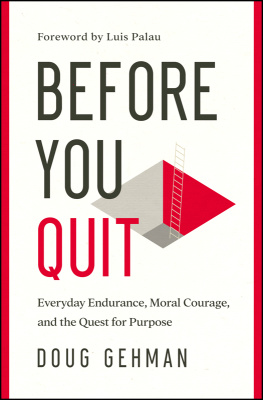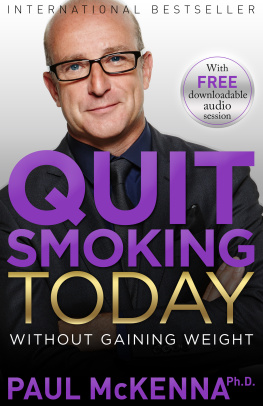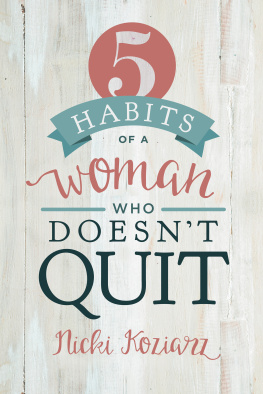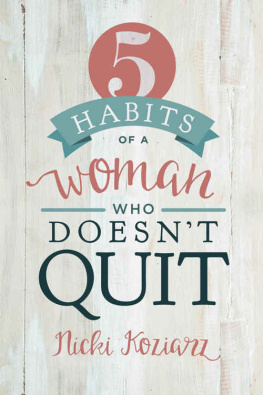Introduction
Progress is impossible without change, and those who cannot change their minds cannot change anything.
George Bernard Shaw
As an innovation and creativity consultant, I one thousand percent believe this quote to be true. I spend my days working with clients who want to change their mindsets, skills, behaviors, organizational systems, and cultures to better embrace change.
My journey to doing the work that I do is inextricably tied to my love for quitting and quitting stories. I counsel clients on pivoting (thinking, products, services, and more), but what is the biggest pivot you can make? A hard quit. A No more, thanks. Never again. Been there, done that. I am giddy every time I can help a client get to the mindset of Who cares if thats how weve always done it? Thats not how we are going to do it anymore.
To quit is to change your mind. Quitting is progress toward the new.
Quitting stories were a part of me starting my business. During the ritualistic lets compare career trajectories small talk that is endemic to Washington, DCwhere I lived at the timeI vividly recall stopping people every time they said something along the lines of Oh, and then I transitioned out of that job and then I... or Then I left that city and... I would say, Whoa wait, back up! Tell me more about why you left that job/city? I found that this was a way to get to know someone at a deeper level than their resume or chronological history. I heard stories about people leaving jobs because they did not feel respected, they needed more money, or due to family pressure. I heard stories of uprooting lives and leaving cities for reasons big and small. By asking people Why? I learned a lot about their values, belief systems, and what was important to them. I learned about what they were willing to endure or not put up with. From these stories, as well as my own quitting experiences, I began to view quitting as not something losers do or as giving up, but as making a life choice and making progress.
I may love a good quitting story now (enough to fill an entire book with them), but I wasnt always so quick to change or question things, myself.
I was one of those (probably irritating) achievers growing up. I wasnt simply a part of every club but the leader/president of it. I was class president and then student council president, homecoming queen, choral leader, lead in the senior musical you get it. You are probably nauseated by it, and I dont blame you. My beloved high school guidance counselor, Mr. Cusick, once half-jokingly said I reminded him of Tracey Flick, the devastatingly aspirational high school student Reese Witherspoon played in the movie Election. Yeah, I got the reference; on top of everything, this super-achiever also had a part-time job at Hollywood Video. I was in on the joke. Mr. Cusick was my high school tennis coach for a bit too. I wasnt even good at tennis, but I never quit playing.
Bottom line, I was a joiner. A do-er. Someone whose word mattered. I took my commitments seriously. I wasnt a quitter.
Its what we all learn: you cant be a quitter and a high achiever.
But in college, I quit something that would impact the rest of my life.
I grew up a comedy nerd, so when I got to college in New York City, I immediately applied for internships available at all of the late-night talk shows. My sophomore year, I got an internship at Late Night with Conan OBrien! It was at Late Night where an older intern suggested that I take an improv class at the theatre she attended. I think youre really funny. I think youd like it, she said. Ever susceptible to flattery and believing what others saw in me, I signed up for an eight-week improv class.
I went to the first class and was pretty immediately uncomfortable. I remember doing a two-person scene with a young, offbeat high school kid; he initiated a scene with me by clucking like a chicken and flapping his arms. I froze. I was uncomfortable. I had no idea how to respond, despite the instructors gentle prodding that any response was a good one. After a long, awkward silence while the whole class waited for me to do something, anything, I blurted out, Im going to eat you! to my classmate, the chicken. I was bad at improv. Not because of what I said, but because of how long it took me to unfreeze in the face of ambiguity. I left that first class and never went back. I quit improv.
I regretted it immediately and for years afterward. I continuously wondered, What if I hadnt quit? Would I have loved it? Would I be writing for a comedy show right now? With the benefit of growing up, gaining hindsight, andmainlybecoming less of an annoying, achieving perfectionist, I realized a few things about this Tracey Flick I was at age twenty:
1.I was used to being good at things.
2.I was used to being good at things because I was carefully selecting and opting-in to only things in which I knew I had a good chance of success. I rarely truly challenged myself.
3.I wasnt good at improv.
4.No one is good at improv right away! Or even for, like, the first five years after they start doing it!
5.I wondered what would have happened if Id just gone back to the next weeks class. I now know that I would have learned that no one is good at improv at the start.
6.I was afraid of learning I was bad at something that might have been important to my career aspirations at the time. Being bad at something wasnt fun for me. So, I just chose not to learn anything about it or about myself at all.
7.I still wanted to do improv.
This was a bad quit. It permitted me to stay in my comfort zone, achieving for the sake of achieving, and put off the big life decisions that would allow me to curate my life (those came later and are referenced below).
After eight years of regret, wondering what if? and with the benefit of some good quits during those years, I wanted to get the monkey off my back. I signed up for an improv class. I remember sitting in a circle with the other students at the very first class, each of us awkwardly perched in the brightly colored, child-size chairs in the rented preschool classroom. The teacher, six years younger than me, asked us all to introduce ourselves and say why we signed up for the class. When my turn came, I said I had signed up to settle an old, emotional score with myself.
This was the start of a now ten-year-long devotion to long-form improv comedy. I loved it. I even loved it when I was bad at it, which was and remains often. I not only went back to that same theatre in New York and took that class, but I also took all the others they offered. Improv is even a big part of my innovation and creativity work now. I un-did this bad quit.
The reason I share this example of a bad quit to introduce a book about stories of people who dont regret quitting things in their lives is because even though I quit improv on my first try, I learned so much about myself in processing why I quit and why I regretted this decision so deeply.

